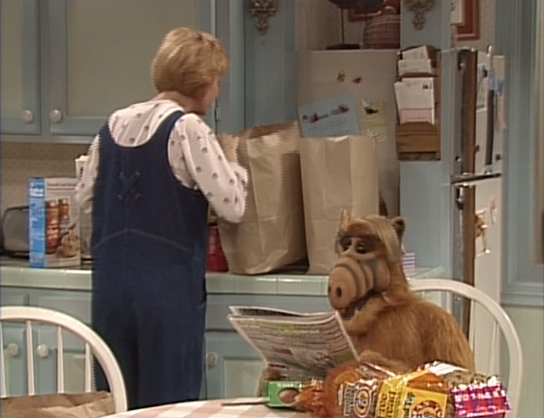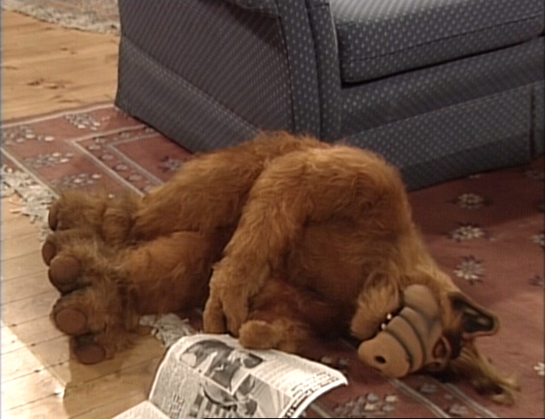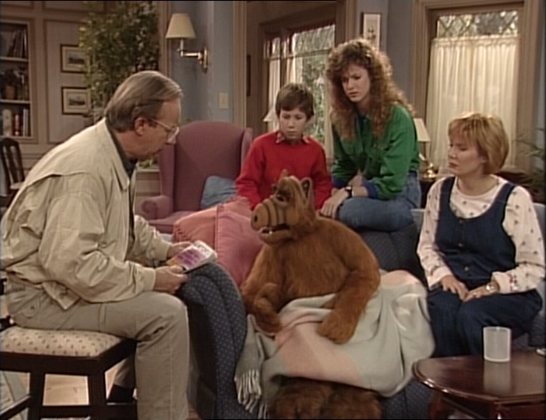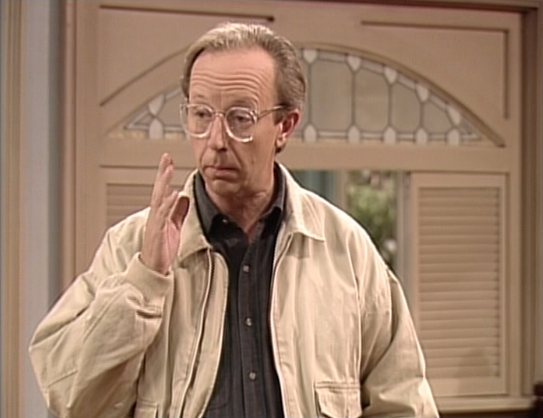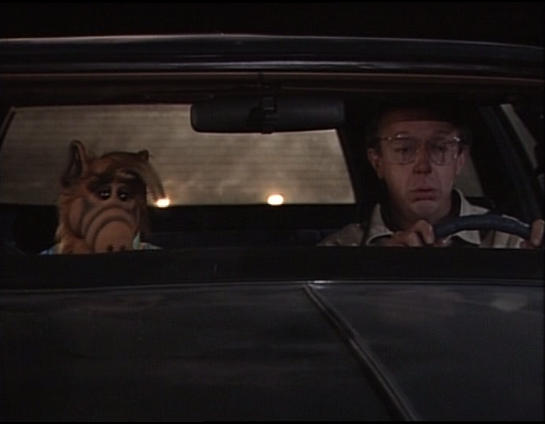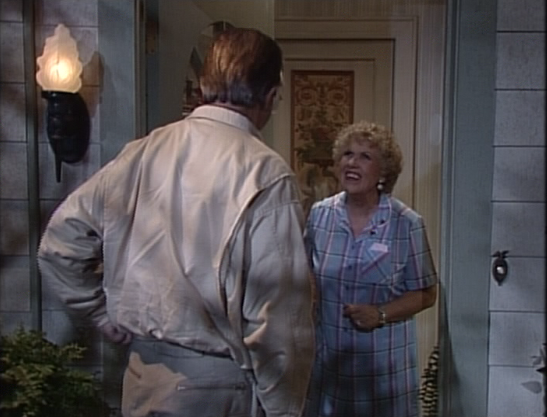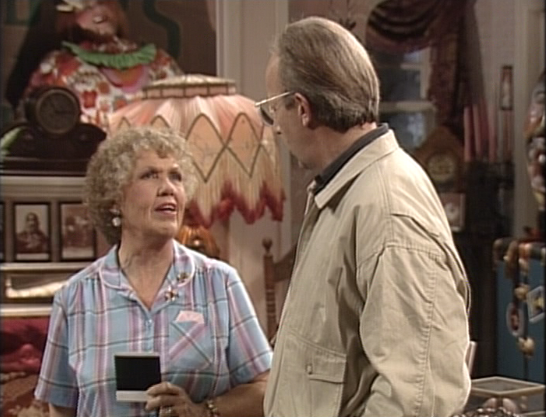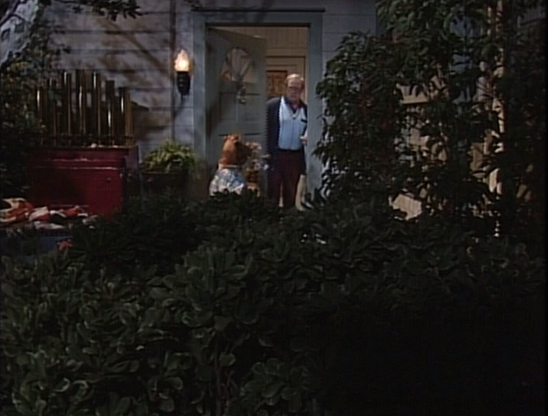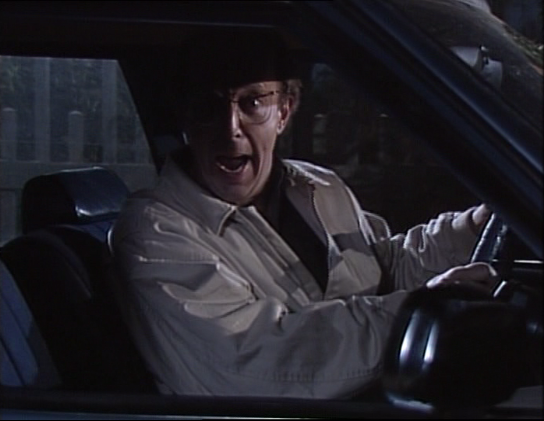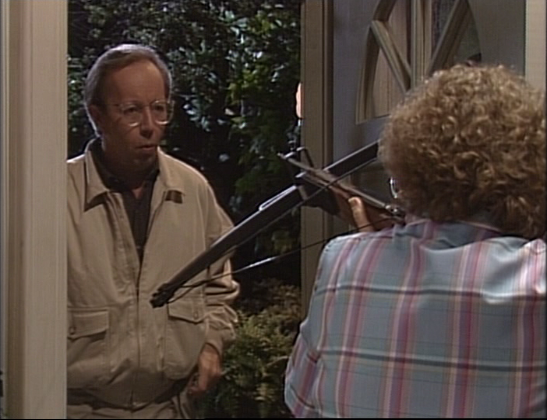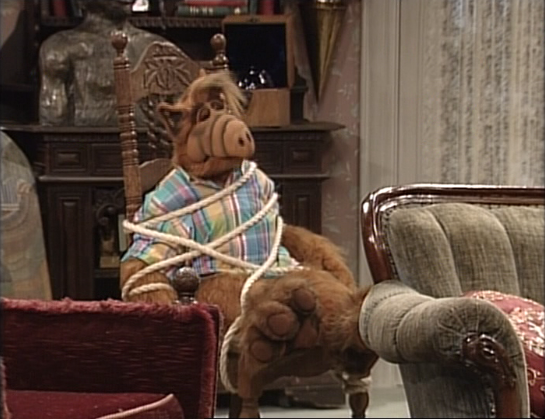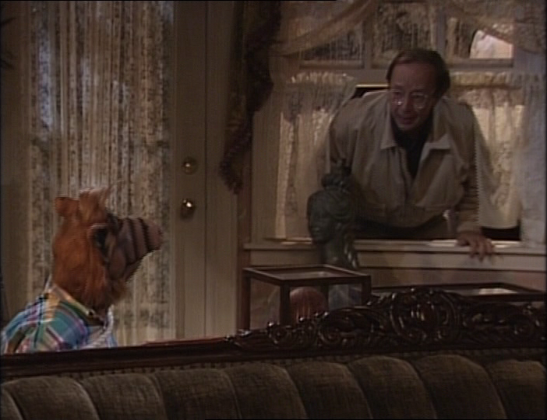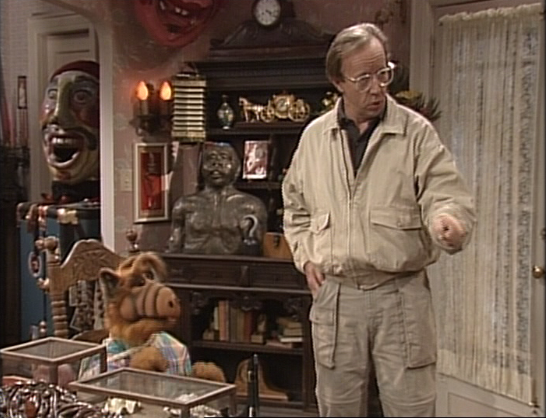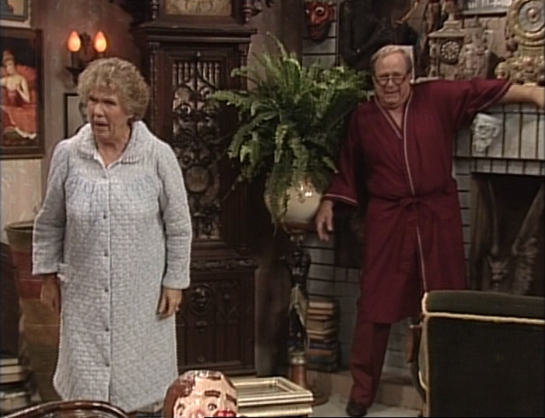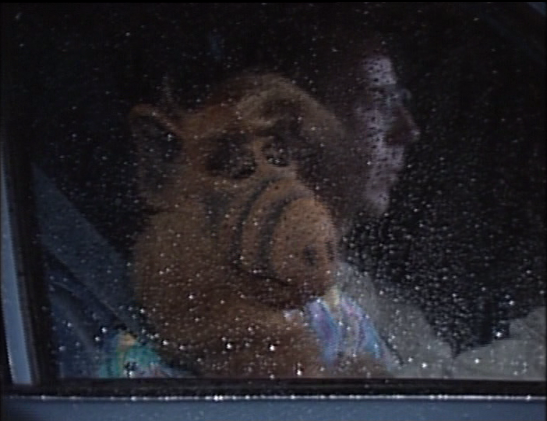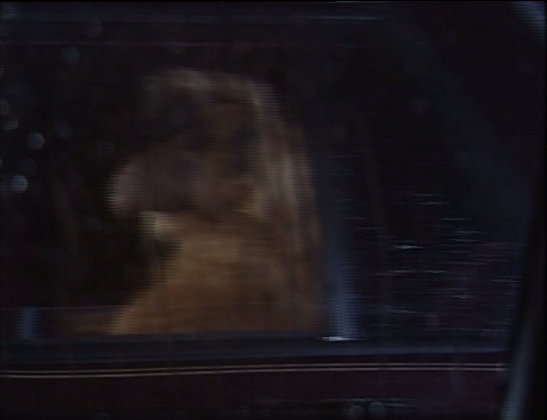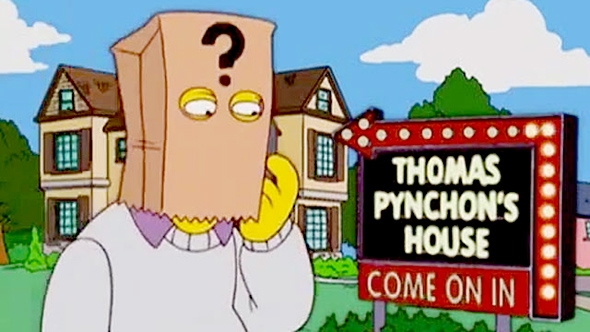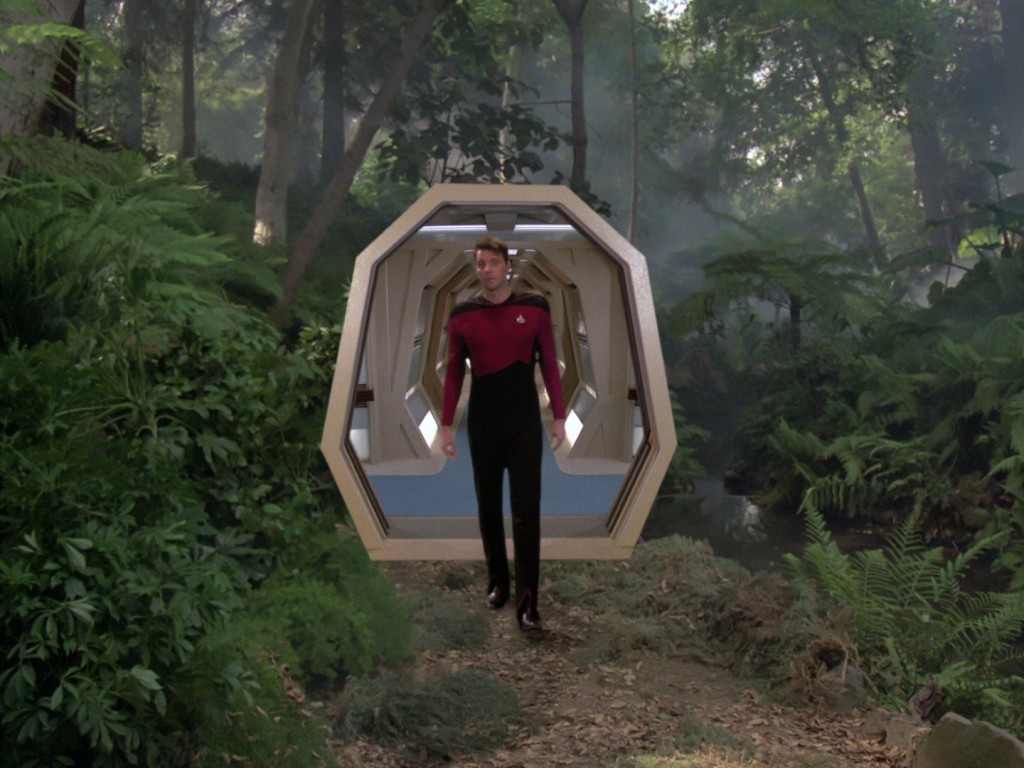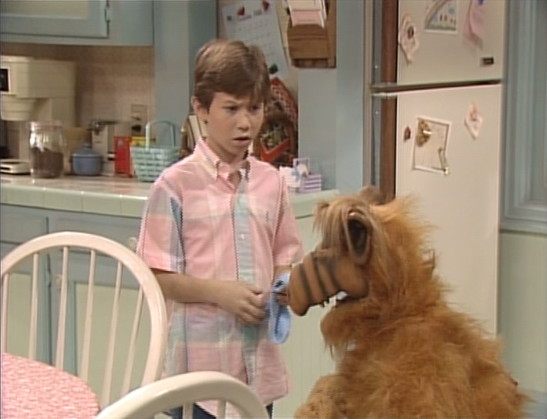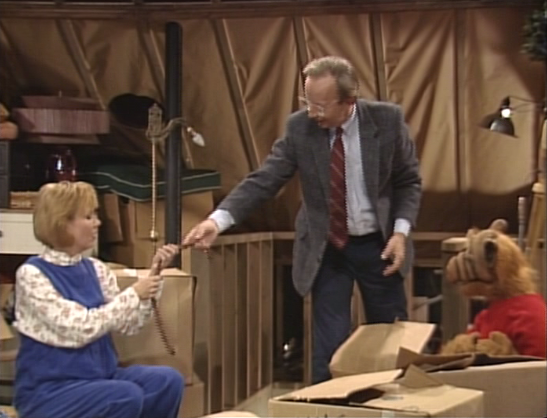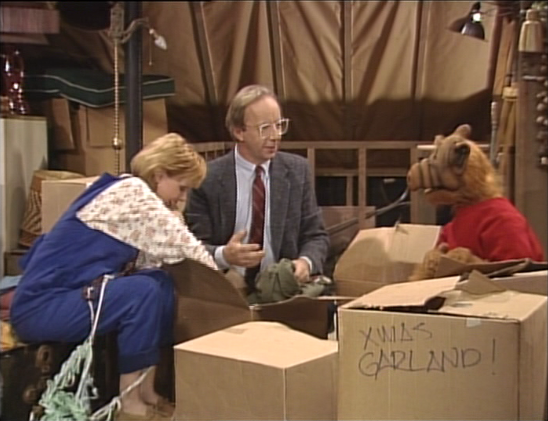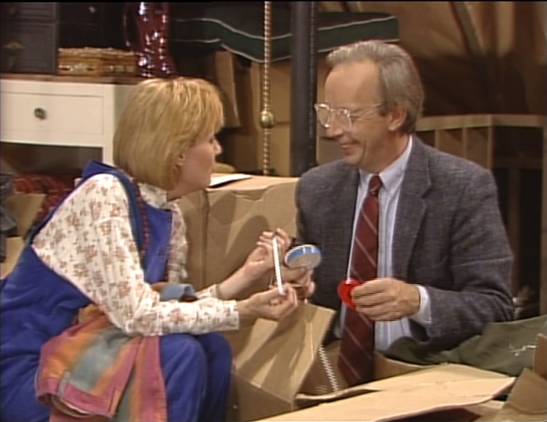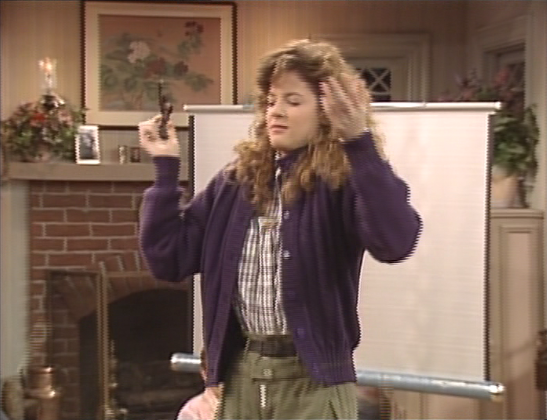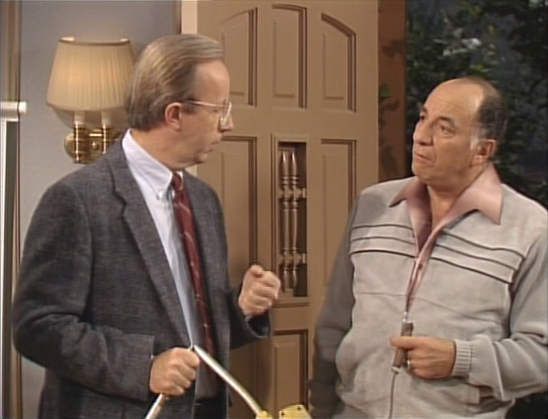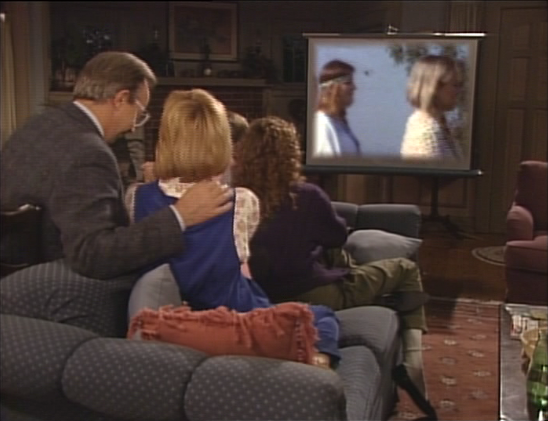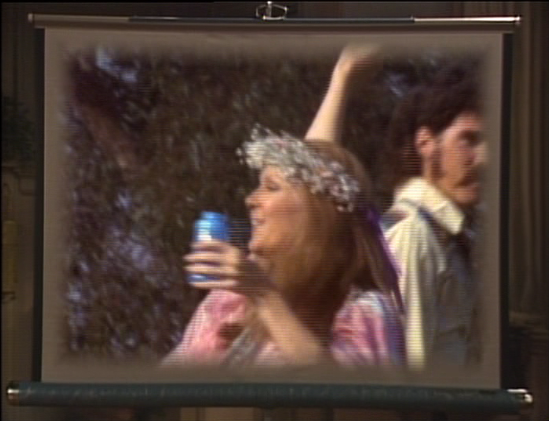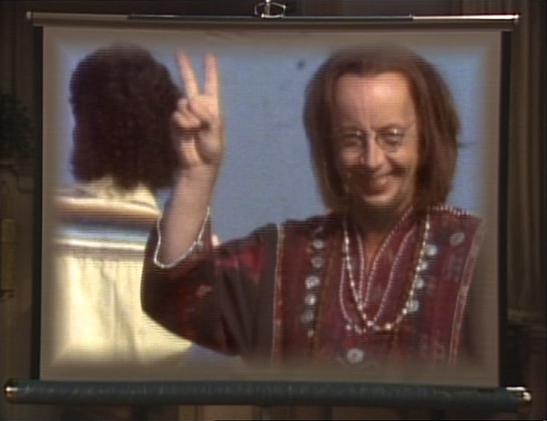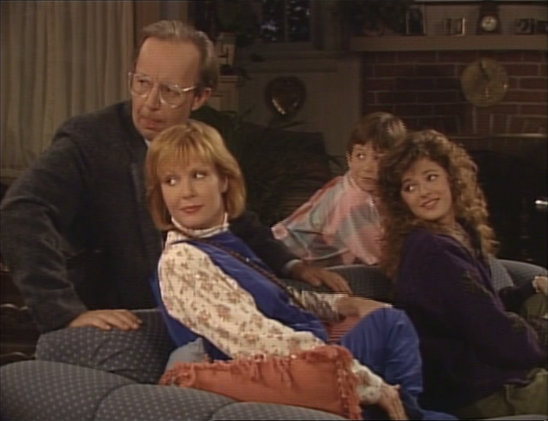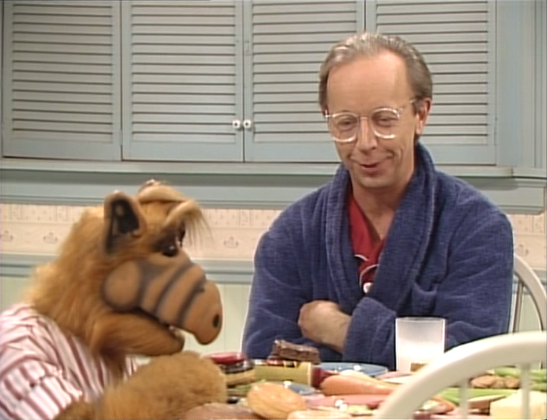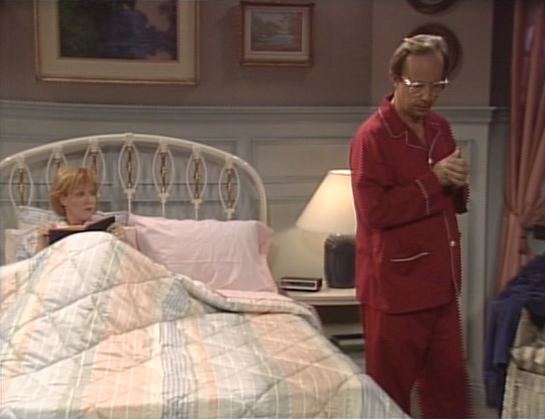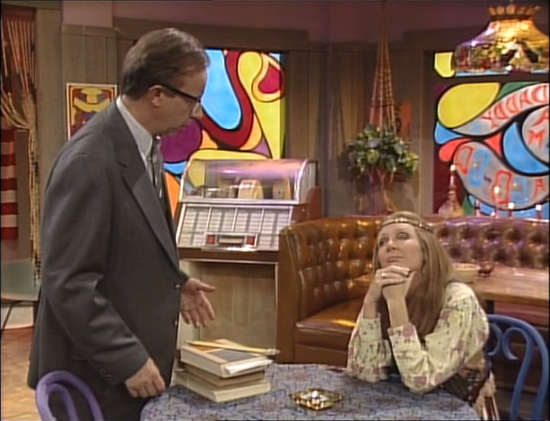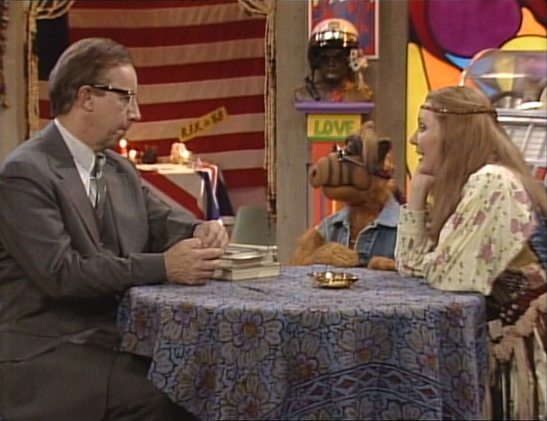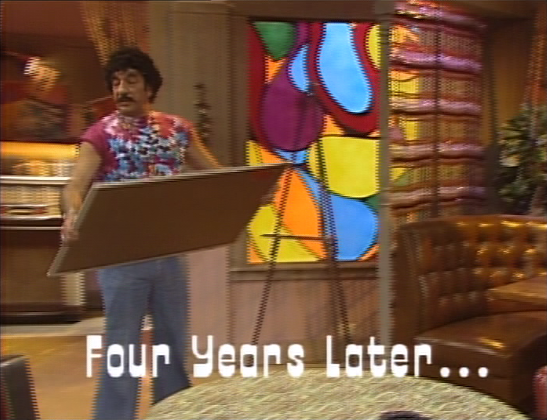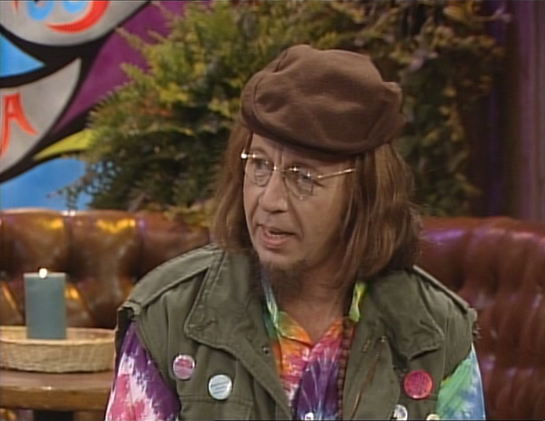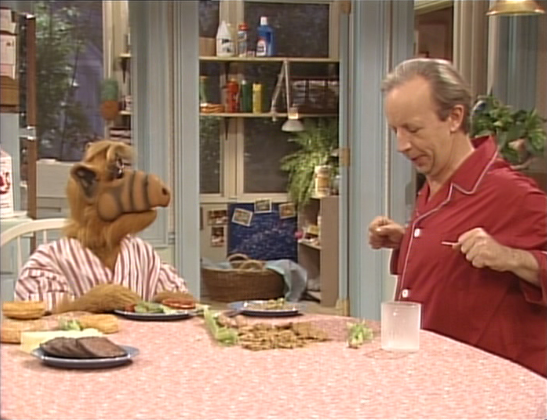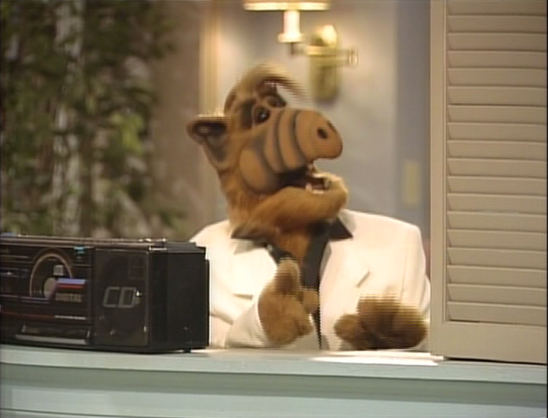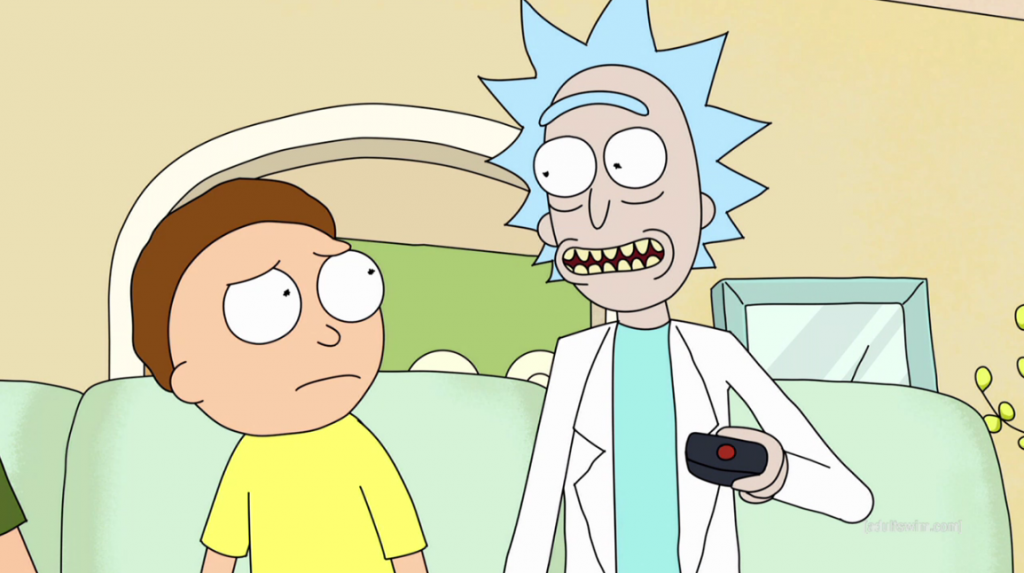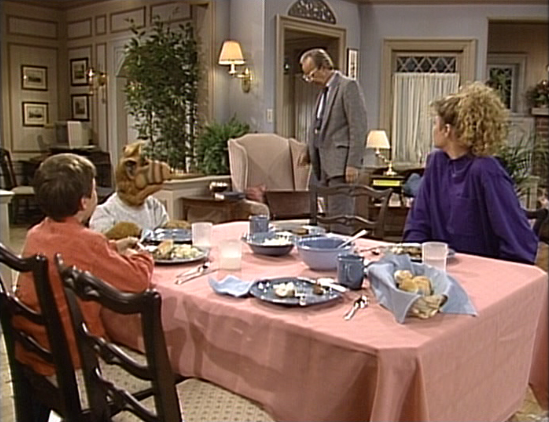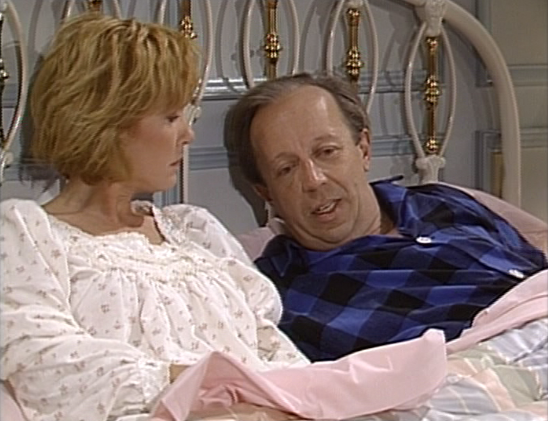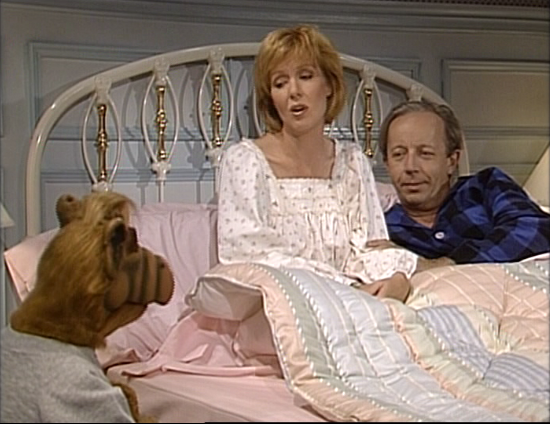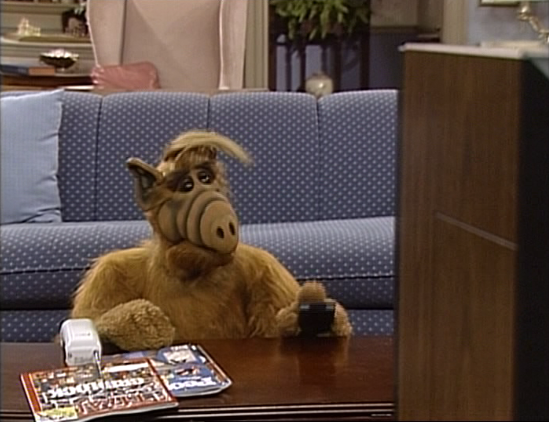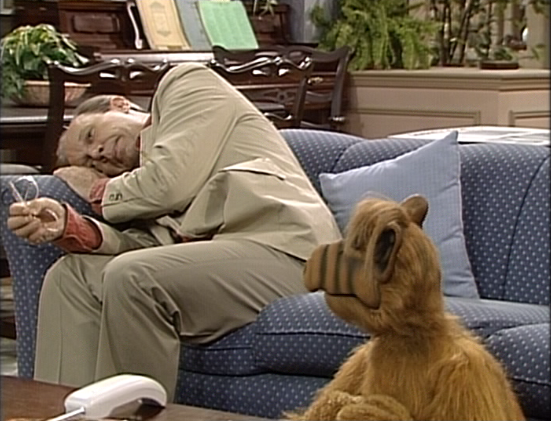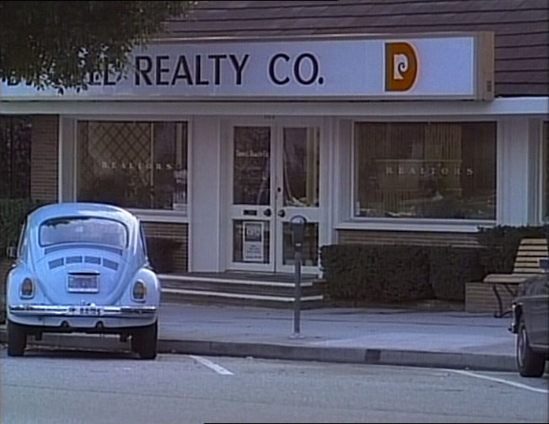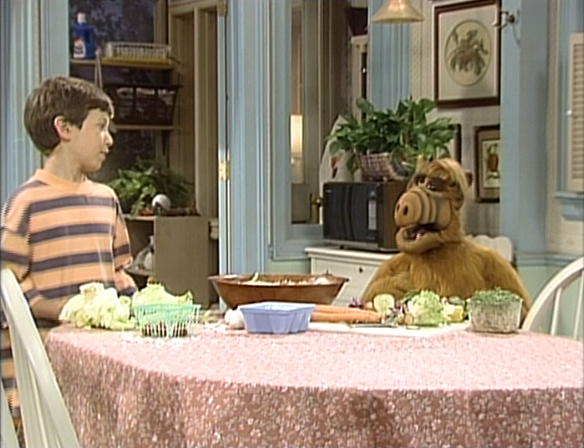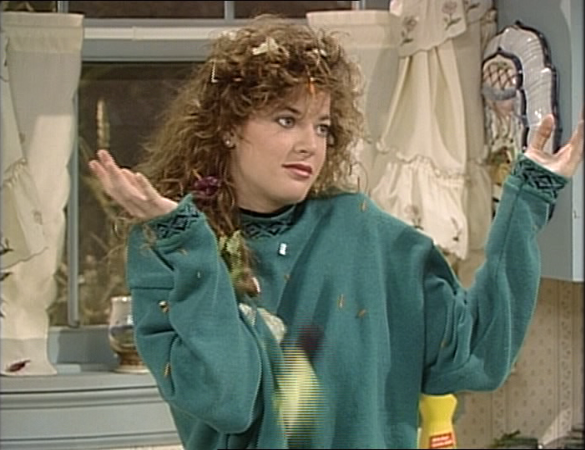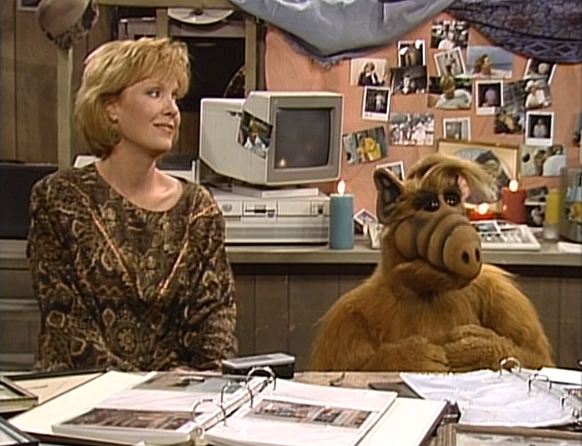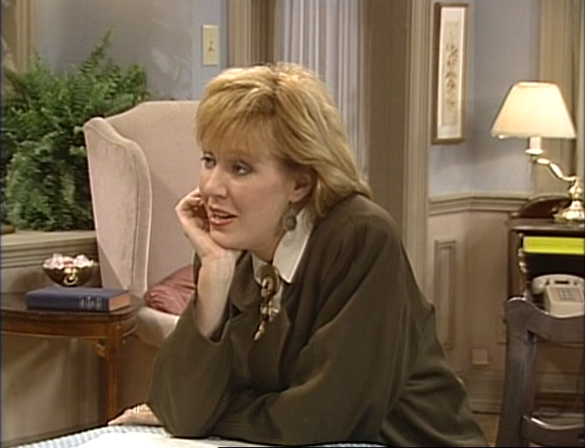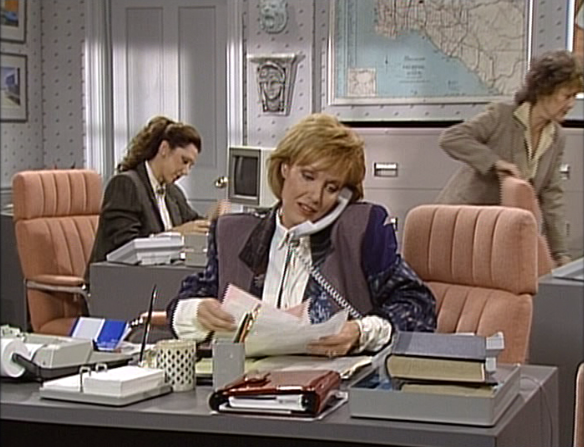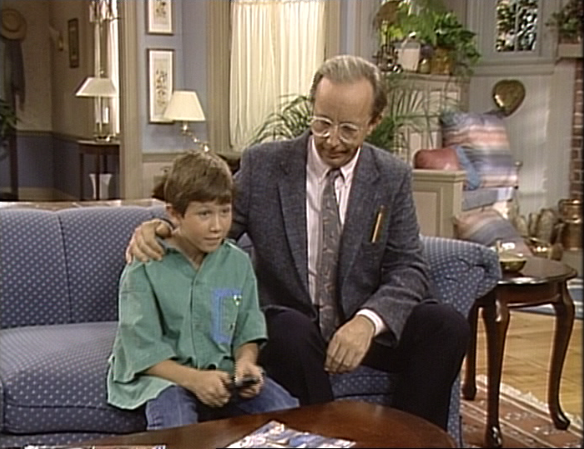So, here’s an odd one. “Alone Again, Naturally” has me conflicted. To be totally honest, I’m not sure I’ll even know how I feel about it until I finish this review. (How’s that for incentive to keep reading?!)
In most cases, it’s pretty basic, forgettable, baseline dumbassery. In other cases, it’s awful. But in other cases still, it’s really well-done.
It’s a patchwork episode, to be sure. It feels as though there was the germ of a great idea here (indeed, I’ll argue that there was), but not much thought went into building a sturdy episode around it.
As it stands…I don’t really know what I think. But I’m glad I watched it, and that’s a definite first for season three.
It opens with Willie and Kate coming home from grocery shopping, while ALF bitches about how long it took them. So, yeah, forgive me for not immediately throwing my arms around this one.
He starts grabbing food out of the shopping bags and eating it because he can’t wait for them to unpack. It’s pretty tiring to endure ALF in screaming-asshole mode, but it leads to a nicely chosen detail: Kate gets him to shut up and back off by handing him a copy of the National Inquisitor. (I hope to God its tagline is “Ignore Me.”)
Kate has gotten in the habit of picking up this magazine when she goes shopping, because it keeps ALF quiet for 30 minutes at a time. And I love this.
I fully believe that ALF would like this magazine. Heck, I remember when I was growing up and I worked at a campground. I’d pick up a copy of Weekly World News on my way to work whenever I had to run the shop during the night hours. I mainly bought it for the awesome (and massive) crossword puzzle, but I’d be lying if I said I never read the articles. It was silly, mindless fun, and while I don’t fault anyone who thinks that magazines like that are a waste of trees, I enjoyed it, and it helped pass some quiet hours. I can see exactly why ALF would find it similarly useful.
What’s more, he’s from space. He’s probably seen some pretty unbelievable stuff. “Reality” on earth may seem pretty mundane for him, so this should be a nice escape. It’s fictional, but it’s also a collection of fantastic tales that may speak to him of a much more exciting world outside the Tanner house. Accurate or not, it’s a way to do a little mental traveling.
It also fits in with his predilection for cultural “junk food,” such as radio call-in shows and reruns of Gilligan’s Island. ALF likes garbage, and that works perfectly. Why wouldn’t he? He’s a space alien. It’s enough of a stretch to think that he’d understand Earthling entertainment at all…let alone be able to tell high entertainment from low. (And, I might add, it would be even more of a stretch for him to buy into such a hazy distinction.)
Then we hear him bellow in the other room, and Willie and Kate open the door to see the funniest thing ever on this show.
Seriously.
I had to pause the episode because I laughing so hard. That’s never happened before with this show, at least not that I can remember.
Of course I think I was supposed to feel sad or concerned or something, but seeing a lifeless ALF on the floor next to the couch has made this entire review series worthwhile. (It also reminds me of a great sequence in “Homer vs. the 18th Amendment,” in which news of prohibition causes the residents of Springfield to faint, and I really want someone to edit this in.)
The credits then begin, ensuring that this is a cliffhanger. “Why is ALF laying on the floor?” being just slightly more gripping a question than “Why am I watching this?”
During the opening sequence, I happen to notice that the credited writer for this episode is Paul Fusco.
Oh boy.
Yeah…this, more than maybe any other episode so far, represents Paul Fusco’s artistic vision.
I don’t want to give away the ending or anything…but the fact that I’m conflicted at all after a Paul Fusco episode has got to be a compliment in itself.
After the credits ALF wakes up and says, in a panic, “No more portly women!”
The fake audience laughs. I have no clue why.
Was he dreaming about being sexually assaulted by tubby ladies? Who knows. The fact that I even have to ask myself that makes me wish I died weeks ago.
As shitty as that moment was, though, I have to give the episode full credit for the fact that we get a really interesting turn. And for the first time in God knows how long, I’m actually curious about seeing where the episode goes.
I’m hooked. I really am. At long last, I care about what’s going to happen.
At first I had no clue what we were watching. I figured ALF would become a staff writer for this stupid magazine, writing first-hand accounts of bizarre things in the unknown universe which the editors assume is just creative writing. You know. A version of “A Little Bit of Soap” that remembers its main character is a space alien.
But it’s much, much better than that.
See, ALF fainted because of an article on page two, about a couple in Barstow that lives with an alien.
And while I was all ready to complain about this — if he regularly reads this National Enquirer equivalent, surely he’s seen similar stories a thousand times — Kate piped up for me, voicing that very note of skepticism.
ALF assures her that this story is different from the others, and Lynn, reading it, identifies some odd similarities.
The alien in the story is short. Fuzzy. Big ears. Long snout. He has an odd fixation on cats.
Brian helpfully blurts, “THAT SOUNDS LIKE ALF,” in case you didn’t associate that description with the creature you see sitting right there in front of you. He might as well have appended “You fucking idiot.” Maybe Brian’s role on this show has sunk to interpreter for the blind.
This is interesting for a number of reasons, and while I’m not jumping to the conclusion that there is another Melmackian hanging out in California, whatever the episode decides to do with this premise, I’m certainly willing to play along.
After all, We know that ALF, Skip, and Rhonda all survived the explosion, but in a civilization that traveled to other planets frequently, it’s certainly likely that other Melmackians survived, too.
Whether or not they’d come to Earth is a whole other story, and the likelihood of that much is definitely debateable, but coming across a story like this in a tabloid is as interesting to me as it is to him. My mind swells with possibilities…and I’m sure ALF’s does, too. This is the promise not of a 30 minute plot, but of possibility, which is something this show as a whole so frustratingly lacks.
My hopes are up, for better or worse.
Lynn questions this alien’s similarity to ALF, though, when she reads that it subsists on a diet of yogurt and lightbulbs. For ALF, though, this is just further evidence: it sounds exactly like his cousin Blinky.
This is a fantastic what-if, and one that actually has something to do with the fact that ALF is an alien.
Those kinds of what-ifs are rare, but they’re responsible for some of the series’ best episodes. What if wildlife from Melmac stowed away on ALF’s spaceship? What if ALF befriended a blind woman? What if ALF isn’t alone on Earth? All rich topics to explore, for sure. Instead, though, in spite of all the spectacular what-ifs that extraterrestrial characters provide, we more often end up closer to “What if Kate’s mom married some guy and ALF had the hiccups?”
For the first time in ages, the show is at least attempting to make good on its promise.
“Alone Again, Naturally,” I’m on your side. This is yours to lose.
Willie, oddly, acts like a human being. He tries to ground ALF in reality, and prevent him jumping to conclusions.
Yes, he says, the details may seem to fit…but it’s still a magazine that prints fiction. And no matter how convincing the story is, the odds are very much against a space alien crashing to Earth and living in secret with a family…
…at which point he trails off.
It’s funny. By this point ALF’s residency in the Tanner home is normalized, and with every day that passes it must get easier and easier to forget that this situation is really fucking strange. In fact, it’s probably not until something like this happens that it really registers, and the face Max Wright makes as the penny drops is perfect.
His first face, that is. For some reason he then makes the second face pictured above, and I don’t care how good a moment this was; once you resort to a string of funny faces to sell your gag, you’ve convinced me your gag isn’t worth selling.
It’s a shame, because the words would have been so much better on their own. But I shouldn’t be surprised that the writers don’t trust themselves. I usually don’t, either.
Willie picks up the phone and calls the family referenced in the story.
He intends to end this fantasy by proving they’re lying, I guess, but all he does is ask, “You don’t really have an alien living with you, do you?”
We don’t even hear their end of the conversation, so we just have to take Willie’s word for it that they said “Yes” in a monumentally convincing tone.
It’s weird. Considering how easily he gives in, and the way the rest of the episode plays out (Willie shows up at their house uninvited, even though this would be a perfect narrative place for him to be invited), I’m not even sure, from a writing standpoint, why he bothers calling.
Anyway, ALF says wants to go to Barstow, but Willie tells him to eat a dick. Then ALF sings the theme song to The Patty Duke Show.
That’s it. He just stands in the middle of the room and sings it for a while.
So, yeah, an irrelevant musical spotlight on ALF? Paul Fusco did write this after all.
This performance of the title theme to a sitcom that no human being alive remembers somehow convinces Willie to take his space alien to Barstow.
Why?
When Willie said, “No, fuck you,” I figured he had some kind of concern about this being a wild goose chase, or a trap, or a prank, or any number of dumbass things.
But really he was just stalling in the hopes that ALF would sing? I…guess so? Jesus Christ.
And of course ALF is in the front seat while Willie drives on a major highway because fuck worrying about revealing this alien to the world anymore. I guess everyone in L.A. has already seen him by now, and two people in Barstow are about to, so who gives a shit?
I’m not sure why Willie is taking him anyway. When they get to the house, Willie makes ALF hide in the car while he himself investigates, which is perfectly fine. But why not investigate alone, and then report back? If Blinky lives there, he could go back for ALF. If he doesn’t live there, there’s no reason to risk any of this crap.
Granted, he does say that Barstow is three hours away, which is indeed a significant two-way drive, but if you’re more concerned about gas money than about the government kicking down your door and gutting your space alien while your children watch, then forgive me for not caring much about that either.
Anyway, ALF hands Willie a cotton ball and asks him to sniff it. Willie, like any rational human being, does exactly this. He takes a big, enthusiastic whiff of this mysterious thing that was handed to him without any context by the naked alien who lives in his hamper.
Then he asks what it is, and ALF says asbestos. Willie throws the cotton ball and makes more funny faces, while the fake audience of hooting retards goes bananas.
It reminds me of a scene in Futurama, when Bender’s “evil” twin sprays toxic gas in Fry’s face and then says, “Get it? It’s chlorine!”
The joke there is pretty clearly the absence of a joke, which is something we can expect the talented writers of Futurama to pull off. Here we just have a few minutes to kill in the middle of an episode, so what the hell, let’s sniff some cotton balls.
Then ALF starts talking about how well Blinky is going to fit into the family, and the scene ends.
…why?
That’s the conversation I want to hear more of.
What does Willie say? How does ALF reply? This is an issue that needs to be discussed, and somehow I don’t think Willie and ALF are going to be in agreement. Why can’t we hear that discussion about whether or not ALF will get to live with his cousin Blinky? Or even get to see him again after this?
We can do things with that. Things that advance the plot and define the characters and give us something to chew on long after the episode is over.
Instead, we get a game of Smell This, Willie. (Thank God for commas, eh?)
God, this scene sucks.
They get to the house and Willie goes to check it out. I know the ALF crew didn’t get along with Max Wright, but did it extend to the a refusal to not iron his shirts?
Look above his belt-line. Just look at that shit.
An old woman answers the door and takes Willie into a room full of bizarre curios, like Billy the Kid’s mustache. She used to run a traveling exhibit until the tent caught fire, so now she just lives with this shit all over her house. It’s a convincingly awkward scene which doesn’t quite tip over into cartoonishness, but it’s also not particularly funny. It’s establishing character, which is certainly good, but it’s unfortunately not going to pay off in any worthwhile way.
Her husband comes in and tells Willie flatly that there’s no alien, but the woman insists there is. The dynamic between she and her husband is an interesting one. At first he comes off as brusque and rude, but before long it becomes clear that his wife isn’t all there, and he’s just tired of having to deal with her delusions. This is best exemplified when she disagrees with him about the pronunciation of his own name. That’s a well-chosen detail, and I now know more about their relationship than I do about Willie’s and Kate’s.
She says the alien is out somewhere, so Willie can’t see it. Then she produces a small box and says a Polaroid of the alien is inside, but Willie has to pay her if he wants to look at it.
Anyone with the barest minimum of brain activity would clock that she’s scamming him, lying to him, or babbling hallucinated nonsense to him, in around zero seconds.
Willie, however, hangs out in the living room, participating in this conversation as though there’s nothing strange at all. He even pays her $10 for a glimpse of the photograph, after her husband helpfully advises him to save his money.
Willie, you fuckbrain.
It turns out to be a picture of a dog with antlers attached to it.
Wow, what a shock. It wasn’t a real alien. Who would have guessed? Fortunately he stops short of paying her to see a picture of the alien’s space ship…but since we later find out that that was his last $10, we probably shouldn’t give him too much credit for learning from his mistakes.
Willie finally begins to tentatively suspect faintly that something might be slightly amiss, and he leaves.
But when he gets back in the car, he looks over and sees ALF doing this:
Which makes Willie do this:
Quite how Willie made it back into the car without passing ALF on his way to the door, or how he didn’t notice the seat was no longer occupied until this moment, I don’t know.
Even less do I know what the living fuck Willie does after he sees that ALF’s missing, since ALF has the time to have an extended conversation with the woman and her husband in their living room.
Get your ass in gear, Willie! Or at least start the car and drive home, confident at last that your troubles are over.
The old lady is excited that she might be able to make some money off of this creature, but her husband doesn’t want his wife starting up her old sideshow days again. Both of which considerations, bafflingly, seem to take precedence over the fact that there’s a pantsless space alien in their living room.
Eventually, after the spousal argument dies down, Willie rings the doorbell. It sure as hell took him long enough.
The woman tells him to buzz off, so he keeps ringing the doorbell and then she answers it again with a crossbow.
And that’s a legitimate laugh.
Really. It’s a perfect bit of visual comedy, and I love it.
Willie backs away, and then calls Kate from a phone booth to explain to her the hilarious Polaroid scam we’ve already seen for ourselves.
If you didn’t like seeing it first-hand, then having Max Wright doggedly relate it, detail for detail, from the inside of a phone booth in the pouring rain is unlikely to enhance its quality in your mind. This guy could be explaining how he saw the towers come down on 9/11 and you’d think he was reciting the side effects of Cymbalta.
Then we cut back to the house and…
Okay, another legitimate laugh. This episode has had a few, but I’m pretty sure only one of them was intentional…and it’s not this one.
The woman babbles for a while about how much money she’s going to make off of him, and her husband tells her to shut up and come to bed.
Neither of them seem particularly interested in or worried about the fact that an extra terrestrial lives with them now, but at least she tied him up for the night. All the Tanners did was show him where they kept the booze and their children.
Willie climbs through the window, and then sits around with ALF babbling about all manner of pointless bullshit instead of untying him. The husband eventually enters with the crossbow, because short of that this scene is never going to progress.
We do get a really fun setpiece out of it, though. Willie attempts to bluff his way through the situation, informing the man that ALF is a creature of unimaginable power…a concept that both the man and ALF struggle to understand.
It’s funny, the way that this bit plays out, with Willie trying to convince the old man that he’s telling the truth, while at the same time trying to get ALF to understand the lie. It’s a funny setup, and the execution is nearly as good, with all three characters struggling to convey or accept what’s happening, without there being time for explanation.
Really, it’s good. And it gets even funnier when ALF catches on and starts moaning and waving his hands at the man, ostensibly demonstrating these powers, while the man just stands there confused.
It’s simple but effective visual comedy…the kind of thing that a low budget sitcom has every right to resort to, and coming at the tail end of a confused episode like this, it works quite well. It’s an absurd, left-field punctuation to a story that wasn’t quite sure what it was about to begin with…and I mean that in a good way.
Since the man doesn’t back off, Willie doubles down on the deception. He says that in ten seconds the man will be “flatter than a flapjack” if he doesn’t let ALF go…which only makes the man more curious. Willie counts down from 10 to one while the stranger stares at him…and then counts back up again.
It’s funnier in action than it probably sounds here. I really like it. Willie’s floundering is when Max Wright’s very particular set of skills, skills he’s acquired over a very long career, come in handy. They enrich Willie rather than distract from understanding his character, and in this case almost — almost — manage to retroactively define who he is.
It’s a fun scene, which would be enough, but it even offers up a nice character moment when the wife comes out of the bedroom…and her husband decides to play into Willie’s ruse.
The husband doesn’t want his wife to start up the traveling freak show again, so when she enters the room he pretends he’s in the throes of ALF’s unimaginable powers, and he tells her that he’ll be killed if she doesn’t let them go.
It works, even if the whole “I’ve decided you can go free” ending is pretty anticlimactic in a show that keeps trying to place the utmost importance on ALF not being seen by anyone, ever.
While her husband distracts her, Willie opens the door to escape, but ALF just stands there watching the argument. Willie beckons to him, and then ALF says, “Oh, yeah!” and starts doing his moaning and hand waving imaginary magic again.
Willie’s exasperated reply (“Not that!”) is delivered perfectly, and the whole scene, batshit crazy as it undoubtedly is, helps to elevate — if not redeem — “Alone Again, Naturally.” In fact, a lot about this episode’s setup and conclusion works just fine. The problem is the connective tissue between them, which just feels…undeveloped.
So Willie and ALF escape, and the episode’s as good as over.
…only, it’s not. At all.
The short scene before the credits is what does redeem the episode. And it takes an absolutely perfect, well-earned turn.
We see the ride home, with ALF and Willie driving in silence through the rain, before, finally, reflecting on what just happened without actually talking about it.
And you know what?
This is good.
This is kind of really good.
It’s probably the best exchange these two have had since “Night Train.” In some very specific ways, I’d argue it’s even better.
There’s something about the way these two dance around what they mean to say…the things they choose to hold back, or to be vague about. Typically these are just the potholes of bad writing, but in certain contexts, deliberately or not, they manage to enrich the material. The negative space between what is said and what is felt defines the conversation. It makes it difficult. It emphasizes distance…however much those having the discussion would like to cross it.
It’s just…I don’t know. It’s a perfect ending for a less-than-perfect episode, and it very nearly tricks me into thinking I’ve been watching something far better all along.
My description can only do it so much justice, so I’ll put some of it here, unbroken, so you can see.
WILLIE: I’m sorry it didn’t work out.
ALF: Me too.
WILLIE: But I’m glad you’re safe.
ALF: Safe and alone. Species-wise.
WILLIE: You know…we all feel alone at certain times in our lives.
ALF: Feeling alone and being alone are two different things.
WILLIE: I’m sorry, ALF. I wish there was something I could say.
ALF: I actually believed it, Willie. I really convinced myself there might be others of my kind here…
And it continues on from there. No jokes. No silliness. Just two sitcom characters driving through the rain, realizing that they have feelings, and wishing they didn’t.
Is it better writing than usual? I don’t know. I’d like to think so…but maybe not. It’s certainly better acting than usual…and the mood has been established better than usual. And I care more about these two characters than usual. So certainly that counts for something.
It’s a lovely scene, and it explores a what-if. In this case, it’s a sad one. It’s a what-if regarding ALF’s excitement being dashed. It’s about the emotional toll that belief takes on him. It’s about how unfair the universe can be, and how uncaring.
And while it deserves a more solid episode ahead of it, the conclusion is strong enough that I’m willing to give “Alone Again, Naturally” the benefit of the doubt.
It’s easily the best episode of the season so far, and I might even go so far as to say it’s a good one.
It’s not without its flaws — not even close — but it raised a question. It gave us a fun shaggy dog story masquerading as an answer. And then it actually answered the question in a satisfying and understated way.
I like this one. God help me, Paul Fusco…you pulled a bait and switch, and I fell for it.
Thank you.
At the very end of the scene, ALF gazes out the window and believes he sees Blinky in the back of another person’s car.
It’s left ambiguous. ALF is convinced he saw this, but Willie says there was no other car.
ALF could be daydreaming, or maybe Willie just didn’t see the passing car through the heavy rain.
Either way, the lack of a definite answer doesn’t make it any less affecting. It’s a nice, mysterious note upon which to end a surprisingly melancholy episode.
It’s left open-ended, with just enough potential for hope, however illusory, that it doesn’t feel tragic.
“Alone Again, Naturally” isn’t the best that ALF is capable of, but I’m okay with that. I like it for what it is. The trip might not have been perfect, but the ride home is downright devastating, and it gives meaning and weight to the experience.
I’ll take that gladly, because it meant somebody cared enough to do this one effectively.
And if that someone was Paul Fusco? Then I just wish that we got to see this side of him more often.
MELMAC FACTS: Melmackian junkfood included “pudding in a shoe,” which was best homemade. ALF had a cousin called Blinky, who was given that nickname because he ate lightbulbs. “I’m so excited I could squirt” was an expression on Melmac, though I sincerely wish it wasn’t.
